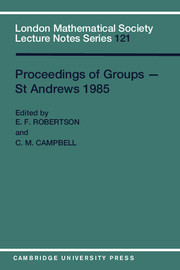Book contents
- Frontmatter
- Contents
- Introduction
- Photograph
- 1 Automorphisms of solvable groups, Part I
- 2 Automorphisms of solvable groups, Part II
- 3 A survey of groups with a single defining relation
- 4 Some algorithms for computing with finite permutation groups
- 5 Five lectures on group rings
- 6 Buildings and group amalgamations
- 7 Finite presentability of S-arithmetic groups
- 8 Efficient presentations of GL(2, ℤ) and PGL(2, ℤ)
- 9 The commutator map
- 10 Polynomial functions and representations
- 11 On questions of Brauer and Feit
- 12 The Picard group and the modular group
- 13 Factor groups of the lower central series of free products of finitely generated abelian groups
- 14 Lattice ordered groups - a very biased survey
- 15 Totally orthogonal finite groups
- 16 One-relator products of groups
- 17 The Cavicchioli groups are pairwise non-isomorphic
- 18 Congruence and non-congruence subgroups of the modular group: a survey
- 19 Small cancellation theory with non-homogeneous geometrical conditions and application to certain Artin groups
- 20 The Lie algebra associated to the lower central series of a group
- 21 Algebraically closed locally finite groups
- 22 On power-commutative and commutation transitive groups
- 23 Dimension function for discrete groups
- 24 Coset graphs
- 25 Nilpotent quotient algorithms
- 26 Generators of p-groups
- 27 On the matrix groups associated to the isometries of the hyperbolic plane
- 28 A characteristic subgroup of N-stable groups
- 29 The isomorphism problem for integral group rings of finite nilpotent groups
- 30 Embedding the root group geometry of 2F4(q)
- 31 On generalized Frobenius complements
- 32 Subgroups of finite index in soluble groups: I
- 33 Subgroups of finite index in soluble groups: II
- 34 Some interconnections between group theory and logic
- 35 Groups covered by abelian subgroups
- 36 Embeddings of infinite permutation groups
- 37 Maximal subgroups of sporadic groups
29 - The isomorphism problem for integral group rings of finite nilpotent groups
Published online by Cambridge University Press: 05 March 2012
- Frontmatter
- Contents
- Introduction
- Photograph
- 1 Automorphisms of solvable groups, Part I
- 2 Automorphisms of solvable groups, Part II
- 3 A survey of groups with a single defining relation
- 4 Some algorithms for computing with finite permutation groups
- 5 Five lectures on group rings
- 6 Buildings and group amalgamations
- 7 Finite presentability of S-arithmetic groups
- 8 Efficient presentations of GL(2, ℤ) and PGL(2, ℤ)
- 9 The commutator map
- 10 Polynomial functions and representations
- 11 On questions of Brauer and Feit
- 12 The Picard group and the modular group
- 13 Factor groups of the lower central series of free products of finitely generated abelian groups
- 14 Lattice ordered groups - a very biased survey
- 15 Totally orthogonal finite groups
- 16 One-relator products of groups
- 17 The Cavicchioli groups are pairwise non-isomorphic
- 18 Congruence and non-congruence subgroups of the modular group: a survey
- 19 Small cancellation theory with non-homogeneous geometrical conditions and application to certain Artin groups
- 20 The Lie algebra associated to the lower central series of a group
- 21 Algebraically closed locally finite groups
- 22 On power-commutative and commutation transitive groups
- 23 Dimension function for discrete groups
- 24 Coset graphs
- 25 Nilpotent quotient algorithms
- 26 Generators of p-groups
- 27 On the matrix groups associated to the isometries of the hyperbolic plane
- 28 A characteristic subgroup of N-stable groups
- 29 The isomorphism problem for integral group rings of finite nilpotent groups
- 30 Embedding the root group geometry of 2F4(q)
- 31 On generalized Frobenius complements
- 32 Subgroups of finite index in soluble groups: I
- 33 Subgroups of finite index in soluble groups: II
- 34 Some interconnections between group theory and logic
- 35 Groups covered by abelian subgroups
- 36 Embeddings of infinite permutation groups
- 37 Maximal subgroups of sporadic groups
Summary
STATEMENT OF THE RESULTS
Ever since Graham Higman's notable thesis [4] the “isomorphism problem for integral group rings” has withstood many attacks:
Given two finite groups G and H, is it true that ℤG ≃ℤH implies G = H? Higman gave a very strong positive answer, in case G is abelian:
(1.1) Every finite subgroup ∪ in the normalized units V(ℤG) - i.e. units of augmentation one - is already a subgroup of G.
Obviously, one can not expect such a strong statement in general, since for any subgroup H of G and a unit u € ℤ G, uHu-1 is a finite subgroup of V(ℤG). Therefore the most one could ask in general is:
(1.2) Is every finite subgroup ∪ of V(ℤG) conjugate in V(ℤG) to a subgroup of G.
But already the dihedral group of order 8,D8, has in V(ℤD8) two conjugacy classes of D8's. It was Berman and Rossa [1] who in 1966 speculated about (1.2), in case G is a finite p-group and ℤ is replaced by ℤp, the ring of p-adic integers, and Ju|∪|=|G|. There are similar considerations in the last chapter of Whitcomb's thesis [6], which he notes as inspired by his advisor, John Thompson.
Our main result in its basic form is a positive answer to this question of Berman and Rossa:
Theorem 1.3. Let G be a finite p-group and H any subgroup of V(ℤp G) with |H|=|G|, then H is conjugate to G by an inner automorphism of ℤpG.
- Type
- Chapter
- Information
- Proceedings of Groups - St. Andrews 1985 , pp. 291 - 299Publisher: Cambridge University PressPrint publication year: 1987
- 2
- Cited by



